Eric Hoffer Quotes
Most popular Eric Hoffer Quotes

We lie loudest when we lie to ourselves.

Youth itself is a talent—a perishable talent.

Animals often strike us as passionate machines.

Every new adjustment is a crisis in self-esteem.

Rudeness is the weak man's imitation of strength.

Every extreme attitude is a flight from the self.

To wrong those we hate is to add fuel to our hatred.

There are no chaste minds. Minds copulate wherever they meet.
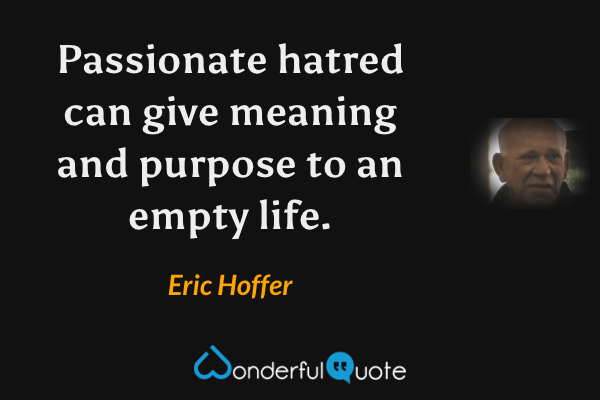
Passionate hatred can give meaning and purpose to an empty life.

Kindness can become its own motive. We are made kind by being kind.

We can be absolutely certain only about things we do not understand.

The search for happiness is one of the chief sources of unhappiness.

It is easier to love humanity as a whole than to love one's neighbor.

Many of the insights of the saint stem from his experience as a sinner.
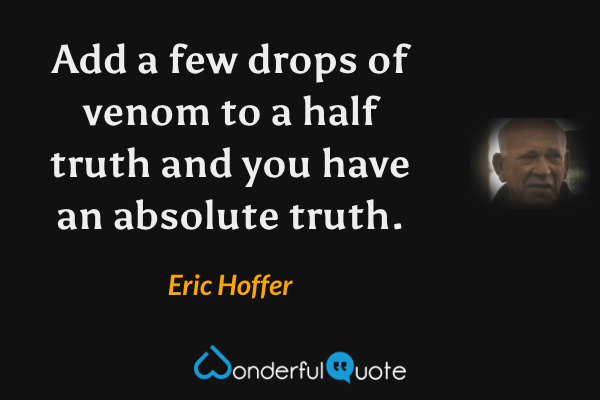
Add a few drops of venom to a half truth and you have an absolute truth.

When people are free to do as they please, they usually imitate each other.

It is by its promise of a sense of power that evil often attracts the weak.

The only way to predict the future is to have the power to shape the future.

Fair play is primarily not blaming others for anything that is wrong with us.

Originality is deliberate and forced, and partakes of the nature of a protest.
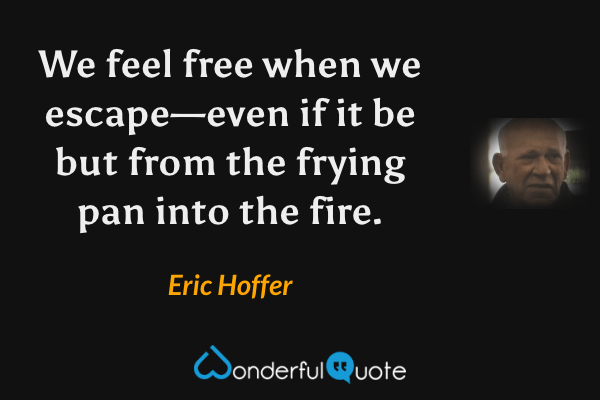
We feel free when we escape—even if it be but from the frying pan into the fire.

The hardest arithmetic to master is that which enables us to count our blessings.

Far more crucial than what we know or do not know is what we do not want to know.

It is loneliness that makes the loudest noise. This is as true of men as of dogs.

Every great cause begins as a movement, becomes a business, and turns into a racket.

The intellectuals and the young, booted and spurred, feel themselves born to ride us.

It is not actual suffering but the taste of better things which excites people to revolt.

The beginning of thought is in disagreement—not only with others but also with ourselves.

It still holds true that man is most uniquely human when he turns obstacles into opportunities.
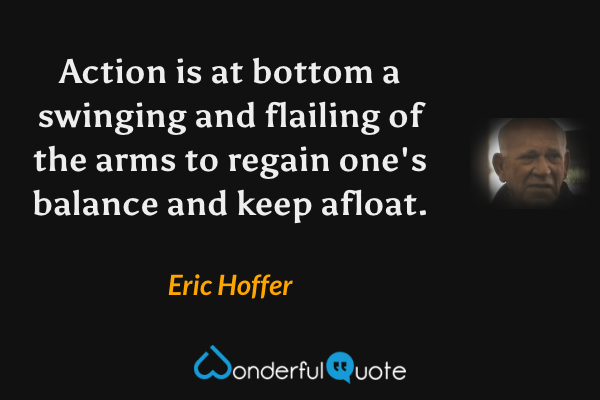
Action is at bottom a swinging and flailing of the arms to regain one's balance and keep afloat.

The hardest thing to cope with is not selfishness or vanity or deceitfulness, but sheer stupidity.

We have rudiments of reverence for the human body, but we consider as nothing the rape of the human mind.

Nowhere at present is there such a measureless loathing of their country by educated people as in America.

Naïveté in grownups is often charming; but when coupled with vanity it is indistinguishable from stupidity.
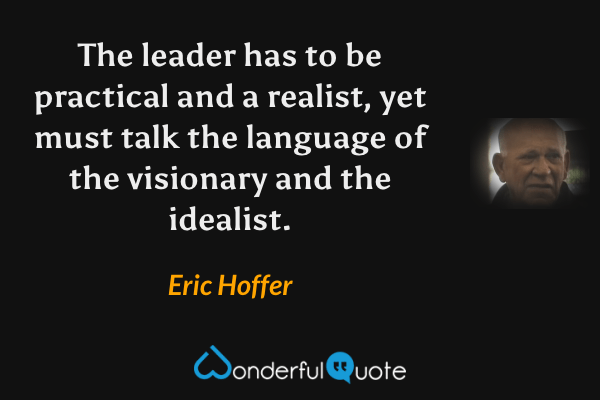
The leader has to be practical and a realist, yet must talk the language of the visionary and the idealist.
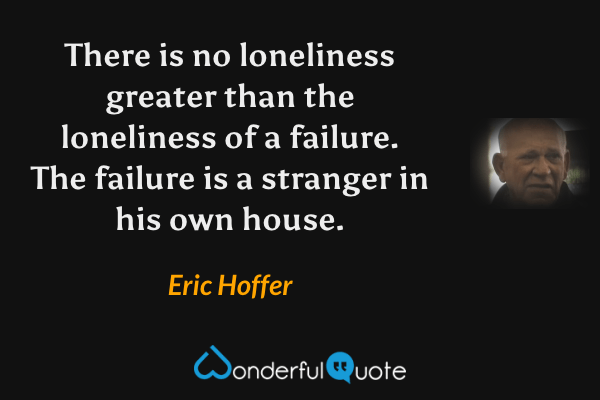
There is no loneliness greater than the loneliness of a failure. The failure is a stranger in his own house.

It is the around-the-corner brand of hope that prompts people to action, while the distant hope acts as an opiate.

Resistance, whether to one's appetites or to the ways of the world, is a chief factor in the shaping of character.

The pleasure we derive from doing favors is partly in the feeling it gives us that we are not altogether worthless.

Where there is the necessary technical skill to move mountains, there is no need for the faith that moves mountains.

There is probably nothing more sublime than discontent transmuted into a work of art, a scientific discovery, and so on.
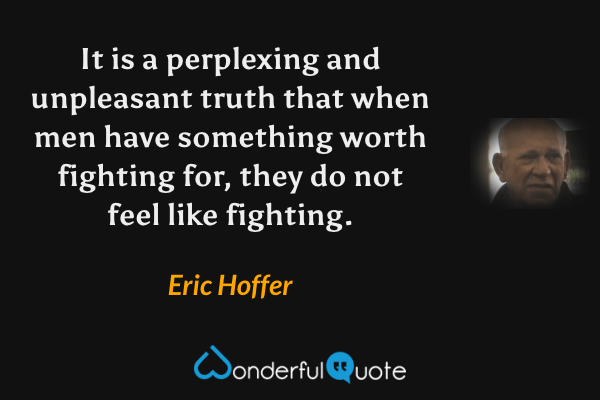
It is a perplexing and unpleasant truth that when men have something worth fighting for, they do not feel like fighting.

The burning conviction that we have a holy duty toward others is often a way of attaching our drowning selves to a passing raft.

When grubbing for necessities man is still an animal. He becomes uniquely human when he reaches out for the superfluous and extravagant.

It is not so much the example of others we imitate as the reflection of ourselves in their eyes and the echo of ourselves in their words.

Compassion is probably the only antitoxin of the soul. Where there is compassion even the most poisonous impulses remain relatively harmless.

When hopes and dreams are loose in the streets, it is well for the timid to lock doors, shutter windows, and lie low until the wrath has passed.

A ruling intelligentsia, whether in Europe, Asia or Africa, treats the masses as raw material to be experimented on, processed, and wasted at will.

The fanatical believer is not conscious of his envy, malice, pettiness and dishonesty. There is a wall of words between his consciousness and his real self.

In a time of drastic change it is the learners who inherit the future. The learned usually find themselves equipped to live in a world that no longer exists.

We are told that talent creates its own opportunities. But it sometimes seems that intense desire creates not only its own opportunities, but its own talents.

The feeling of being hurried is not usually the result of living a full life and having no time. It is, rather, born of a vague fear that we are wasting our life.

The control of our being is not unlike the combination of a safe. One turn of the know rarely unlocks the safe. Each advance and retreat is a step toward one's goal.

The less justified a man is in claiming excellence for his own self, the more ready he is to claim all excellence for his nation, his religion, his race, or his holy cause.

We need not only a purpose in life to give meaning to our existence but also something to give meaning to our suffering. We need as much something to suffer for as something to live for.

Old age equalizes—we are aware that what is happening to us has happened to untold numbers from the beginning of time. When we are young we act as if we were the first young people in the world.

The quality of ideas seems to play a minor role in mass movement leadership. What counts is the arrogant gesture, the complete disregard of the opinion of others, the singlehanded defiance of the world.

Our credulity is greatest concerning the things we know least about. And since we know least about ourselves, we are ready to believe all that is said about us. Hence the mysterious power of both flattery and calumny.
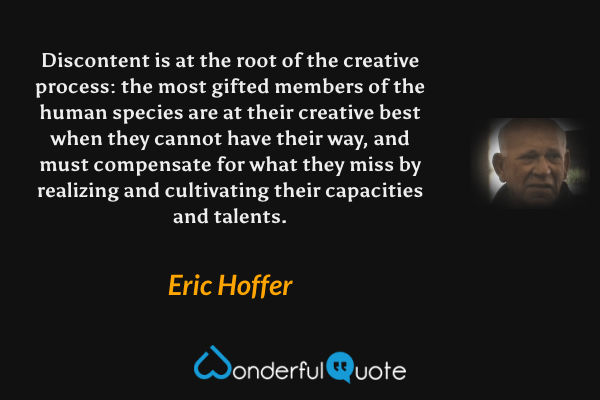
Discontent is at the root of the creative process: the most gifted members of the human species are at their creative best when they cannot have their way, and must compensate for what they miss by realizing and cultivating their capacities and talents.

There are many who find a good alibi far more attractive than an achievement. For an achievement does not settle anything permanently. We still have to prove our worth anew each day: we have to prove that we are as good today as we were yesterday. But when we have a valid alibi for not achieving anything we are fixed, so to speak, for life.
Every great cause begins as a movement, becomes a business, and eventually degenerates into a racket.
In a time of drastic change it is the learners who inherit the future. The learned usually find themselves equipped to live in a world that no longer exists.


